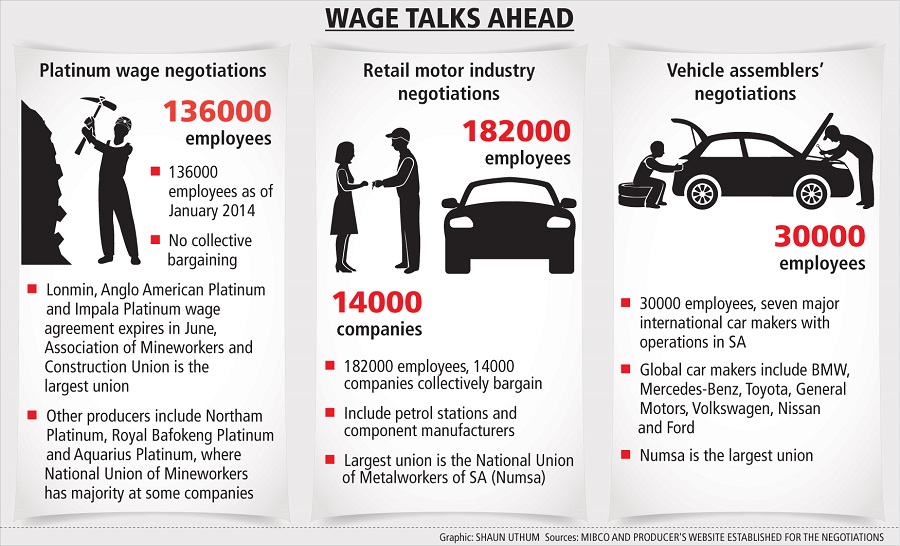THE struggling platinum industry will go into wage negotiations this year, while multiyear agreements in the car sector are due to be renegotiated.
Protracted motor industry negotiations — which three years ago prompted strong words from BMW, one of several major assemblers in SA — are coming soon after approval of the latest industry support plan, due to start in 2020.
BMW is to invest more than R6bn in its South African subsidiary to build the next-generation X3 sports utility vehicle.
The building of the vehicle will replace the manufacturing of the 3-series sedan, which the car maker has been assembling at the company’s Rosslyn plant near Pretoria since 1983.
However, it is to the platinum industry that much attention will be paid.
Unlike gold producers, who negotiate with unions as one group, platinum miners face the unions individually in wage talks.
The platinum price has taken a beating on international stock markets as a result of cooling Chinese demand, and the pain is expected to continue this year.
The wage agreement with producers Lonmin, Anglo American Platinum (Amplats) and Impala Platinum, at which the Association of Mineworkers and Construction Union (Amcu) is the largest union, ends in June.
Amplats shares shed two-thirds of their value on the JSE last year and Lonmin shares lost 99% of their value on the exchange.

The labour landscape was underpinned by turbulence last year with the spectre of job cuts in the mining and steel industries looming large, while companies went on aggressive belt-tightening drives to stay afloat.
The crisis was crystallised when Evraz Highveld Steel went into business rescue and ArcelorMittal SA began reviewing its operations. Both companies, the country’s biggest in the sector, pleaded with the state to institute import tariffs on cheap Chinese steel.
The government, business and labour eventually struck stability pacts to de-escalate the crisis.
This year, the National Union of Metalworkers of SA (Numsa) will push for the nationalisation of the steel sector and its value chain, the union’s national bearers proclaimed in its year-end statement.
Numsa is also expected to convene a workers’s summit this year to establish a new trade union federation and a workers’s party.
In addition, Numsa will be heading for major wage negotiations in the car sector, which has economic linkages to the steel and engineering sector.
These wage talks will test the union’s resolution to agitate for collective bargaining based on economic value chains.
Instead of bargaining on a segmented basis, as is the case now, the union wants the process consolidated and streamlined into a single mechanism for workers across the car industry value chain.
The three-year wage deal covering 200,000 employees in vehicle manufacturing and assorted industries ends in August.
Numsa is also poised to bargain in the retail motor industry on behalf of service staff, petrol attendants and component manufacturers’s workers when their agreement ends in September.
Labour analyst Tony Healy says the pattern of retrenchments experienced during the past few years is likely to continue in 2016, and even gain momentum.
Mr Healy expects small and medium enterprises to be the hardest-hit.
"My sense is that years of substandard growth are now starting to bite in the sectors that don’t have the wherewithal to fund their way through it," he says.
Larger organisations may have options — such as approaching shareholders for capital — but many employers with 100 to 500 people on their payrolls "have already mortgaged the house and sold the boat", says Mr Healy.
Union rivalry and competition are likely to feature prominently this year and might lead to employers spending more time on labour relations issues, he adds.
In mining, last year’s gold wage negotiations are yet to be fully concluded. Sibanye Gold and Amcu expected to re-enter wage talks after the festive season break.
Amcu has repeatedly given assurances that its members at Sibanye have resolved not to strike pending a Labour Appeal Court judgment that will determine the workers’s right to strike at other bullion producers that have sealed wage agreements.
Producers, with the exception of Sibanye, concluded wage deals last October.
However, the lack of a clear union majority at Sibanye has meant that Amcu still has the right to strike at the company despite it having struck a deal with the NUM, the United Association of SA as well as with Solidarity.
The Labour Appeal Court judgment could clarify whether Amcu has the right to strike at mines in which it has a majority even if its representation at the company level is insufficient.
Sibanye has indicated it will not revise the wage offer accepted by the other three unions.
* An earlier version of this article incorrectly stated that Northam Platinum would be entering into wage negotiations with the Association of Mineworkers and Construction Union in 2016. The National Union of Mineworkers is the majority union at Northam, which struck a three year wage deal with its workforce at its Zondereinde mine in 2015.





















Change: 1.19%
Change: 1.36%
Change: 2.19%
Change: 1.49%
Change: -0.77%
Data supplied by Profile Data
Change: -0.08%
Change: 0.12%
Change: 1.19%
Change: 0.00%
Change: 0.10%
Data supplied by Profile Data
Change: 0.21%
Change: 0.18%
Change: 0.17%
Change: 0.07%
Change: 0.23%
Data supplied by Profile Data
Change: 0.17%
Change: -0.20%
Change: 0.19%
Change: 0.00%
Change: 0.36%
Data supplied by Profile Data